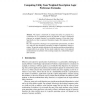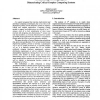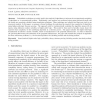346 search results - page 13 / 70 » Logical omniscience as a computational complexity problem |
DALT
2009
Springer
14 years 4 days ago
2009
Springer
We propose a framework to compute the utility of a proposal w.r.t. a preference set in a negotiation process. In particular, we refer to preferences expressed as weighted formulas ...
ECBS
1996
IEEE
14 years 27 days ago
1996
IEEE
It is widely recognized that real-time,fault-tolerant and distributed computing technologies play a key role in the deployment of many current andfuture (civilian or Defense) crit...
LICS
2006
IEEE
14 years 2 months ago
2006
IEEE
aic semantics, which conveniently abstracts from the details of a given model class and thus allows covering a broad range of logics in a uniform way. Categories and Subject Descri...
JCST
2010
13 years 3 months ago
2010
Probabilistic techniques are widely used in the analysis of algorithms to estimate the computational complexity of algorithms or a computational problem. Traditionally, such analys...
ISMVL
1994
IEEE
14 years 25 days ago
1994
IEEE
The problem of approximating a propositional calculus is to nd many-valued logics which are sound for the calculus (i.e., all theorems of the calculus are tautologies) with as few...



